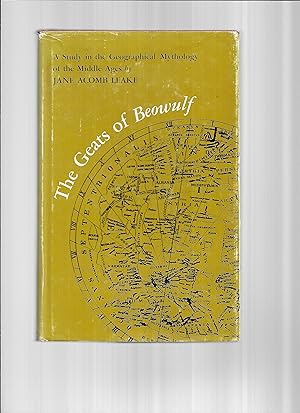geats beowulf study geographical mythology de leake jane acomb (4 résultats)
Filtres de recherche
Type d'article
- Tous les types de produits
- Livres (4)
- Magazines & Périodiques (Aucun autre résultat ne correspond à ces critères)
- Bandes dessinées (Aucun autre résultat ne correspond à ces critères)
- Partitions de musique (Aucun autre résultat ne correspond à ces critères)
- Art, Affiches et Gravures (Aucun autre résultat ne correspond à ces critères)
- Photographies (Aucun autre résultat ne correspond à ces critères)
- Cartes (Aucun autre résultat ne correspond à ces critères)
- Manuscrits & Papiers anciens (Aucun autre résultat ne correspond à ces critères)
Etat En savoir plus
- Neuf (Aucun autre résultat ne correspond à ces critères)
- Comme neuf, Très bon ou Bon (1)
- Assez bon ou satisfaisant (1)
- Moyen ou mauvais (Aucun autre résultat ne correspond à ces critères)
- Conformément à la description (2)
Reliure
- Toutes
- Couverture rigide (4)
- Couverture souple (Aucun autre résultat ne correspond à ces critères)
Particularités
- Ed. originale (1)
- Signé (Aucun autre résultat ne correspond à ces critères)
- Jaquette (2)
- Avec images (1)
- Sans impressions à la demande (4)
Langue (1)
Prix
- Tous les prix
- Moins de EUR 20 (Aucun autre résultat ne correspond à ces critères)
- EUR 20 à EUR 45
- Plus de EUR 45
Livraison gratuite
Pays
Evaluation du vendeur
-
The Geats of Beowulf: A Study in the Geographical Mythology of the Middle Ages
Edité par The University of Wisconsin Pres, 1967
Vendeur : Midtown Scholar Bookstore, Harrisburg, PA, Etats-Unis
EUR 30,92
Autre deviseEUR 5,17 expédition vers Etats-UnisQuantité disponible : 1 disponible(s)
Ajouter au panierhardcover. Etat : Good. No dust jacket. Good hardcover with some shelfwear; may have previous owner's name inside. Standard-sized.
-
The Geats of Beowulf; a study in the geographical mythology of the Middle Ages
Edité par Madison, The University of Wisconsin Press, 1967
Vendeur : Hammer Mountain Book Halls, ABAA, Schenectady, NY, Etats-Unis
EUR 36,40
Autre deviseGratuit expédition vers Etats-UnisQuantité disponible : 1 disponible(s)
Ajouter au panierHardcover. Ex-library (college closed), with the usual ownership markings; otherwise very good condition. . 212p.
-
The Geats of Beowulf: A Study in the Geographical Mythology of the Middle Ages
Edité par The University of Wisconsin Press, 1967
Vendeur : Brused Books, Pullman, WA, Etats-Unis
EUR 66,59
Autre deviseGratuit expédition vers Etats-UnisQuantité disponible : 1 disponible(s)
Ajouter au panierHardcover. Etat : Fine. Etat de la jaquette : Good. Hardcover is almost like new except inscription inside front cover. Good dust jacket has shelf rubbing and a couple of small edge tears. Book.
-
THE GEATS OF BEOWULF: A Study In The Geographical Mythology Of The Middle Ages
Edité par Madison WI etc~. 1967. Univ. Of Wisconsin Press, 1967
Vendeur : Chris Fessler, Bookseller, Howell, MI, Etats-Unis
Edition originale
EUR 133,19
Autre deviseEUR 5,13 expédition vers Etats-UnisQuantité disponible : 1 disponible(s)
Ajouter au panierbrown full cloth hardcover 8vo. (octavo). dustwrapper in protective plastic book jacket cover. fine cond. binding square & tight. covers clean. edges clean. contents free of markings. dustwrapper in near fine cond. rubbed at spine top & corners, along flap edge, on rear panel, not price clipped. nice clean copy. no library markings, store stamps, stickers, bookplates, no names, inking, underlining, remainder markings etc~. first edition. first printing (same date on title & copyright page, no additional printings indicated). glossy b&w frontis. map (medieval). 212p. 8 glossy b&w maps plates. 2 appendices. notes. bibliography. index. medieval history. medieval literature. mythology. ~ TOWERING above all other surviving texts of Old English Literature is the epic tale of Beowulf, king and hero of the Geats. Despite generations of intense critical scrutiny of the poem, there remain many unresolved questions; one of the most important is the identity of Beowulf's people. Who were the Geats? In the past they have been identified both with the historic Jutes and with the Gautar, a people of southern Sweden, and efforts have been made to trace, by means of the poem, the dynastic histories of various Scandinavian peoples. No satisfactory identification has been found, although their historic existence has never been questioned. Mrs. Leake advances a new and startling thesis: the Geats may have been the Getae, a tribe of ancient Thrace. After showing that the identification of the Geats with the Jutes or with the Gautar requires distortions of primary evidence, the author then assembles an impressive amount of data to justify her assertion that the Geats ought to be equated with the Getae, the Thracian tribe who had disappeared by the end of the classical period, but whose name and history, real and mythical, survived in patristic and medieval literature. Examining the problem from the viewpoint of the historian and historical geographer, Mrs. Leake indicates that medieval writers, completely dependent on classical and patristic sources, took up and amplified the ancient history of a mysterious northern people, whom they placed somewhere in Scandinavia. She further documents the development of the Getic legend, expounding on the Getae's transference relation to the Goths, who settled in the former Getic lands, and their mythical association with the biblical Gog~Magog. The Getae~Goths possessed fabulous qualities: unbelievable strength, huge stature, and prowess in battle. The Gog~Magog Were huge and strong, but also filthy, vile, and savage. The characteristics of these two concepts became fused into one image, which is representative of the people in Beowulf. Mrs. Leake points out that in medieval literature the Getes are consistently located in the North in the same area the Gears occupy in Beowulf, and she explores the linguistic and textual evidence of the similarity between their names and traits as support for her contention that the Geats are the Getae. Her fresh approach to this long~standing and vexing problem will undoubtedly open the way to re~evaluations in Beowulf studies. [scarce item].



